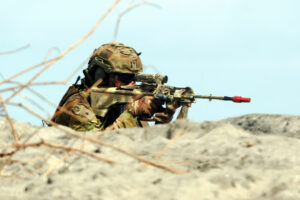
National security: Should business worry?
The Philippines continuously faces threats from both internal and external sources. The evolving trends and issues on security, such as territorial expansionism, volatile geopolitical competition and conflicts, the pandemic, internal threats to peace, terrorism, and natural and man-made calamities, continue to challenge the country. They can potentially affect our national defense and can pose an adverse impact to national development.
A holistic approach is needed for defense and security that extends beyond managing traditional military threats. The priority plans and programs to mitigate these issues were discussed by the Senior Undersecretary of the Department of National Defense (DND) Irineo C. Espino during the Sept. 20 Management Association of the Philippines (MAP) General Membership Meeting at the Ceremonial Hall of the Marriott Grand Ballroom.
He affirmed the overall thrust that “the Defense department is guided by its vision to guarantee the country’s security, territorial integrity, and sovereignty; continue to be a reliable partner in national development, and a strategy-player in the Asia-Pacific region.”
He added that the DND has a multi-faceted role of not only addressing defense issues but is also committed to ensuring the well-being and development of the nation and the Filipino people. A whole-of-nation approach is needed to carry out this mandate.
Mr. Espino likewise said that the major concern of the business sector is the peace and order in the country or the internal threats to peace. Insurgents attempt to derail operations of businesses, but the Defense Undersecretary assures that the insurgency in the country will be cleared before the year ends. This will ease the worries of existing businesses and startups — and hopefully pave the way for their growth.
The intent of the DND is to focus on external threats and come up with a capable defense posture to protect the country. The armed forces give priority to the commands that address external threats and most of these are directed to China.
The DND coordinates with the United States (US) government for joint maritime activities. According to Mr. Espino, China’s continued aggressive actions in territorial and maritime disputes, such as the West Philippine Sea, will remain a priority concern due to its implications to the country’s sovereignty, sovereign rights, and jurisdiction. Joint activities with our foreign counterparts are ongoing to provide solutions to address this problem. Equipment from other countries were also being procured, such as naval vessels and aircrafts, mostly donated by the US to the Philippine Air Force.
The Philippines needs to upgrade its weaponry through modernization. However, the challenge in upgrading the defense capability in the country is the financial cost. The support of the President alone is not enough to fund all the expenses needed to produce equipment. The DND specifies a requirement for suppliers to include in their packages: training, maintenance, and technology exchange. The DND likewise aims to produce this equipment in the future.
Aside from the hardware, the DND will also undertake re-educating and re-skilling of its personnel for competency enhancement. The modernization shift pushes the DND to opt for optimal deterrence and sustainability as it aims for an ambitious goal of achieving a modern, self-reliant, and combat-ready defense force.
Mr. Espino gave an update on the Reserve Officers’ Training Corps (ROTC), saying that it will be brought back to schools as a form of military training. This will be an orientation for emergency purposes for young people to be combat-ready. Aside from this, other expertise will be utilized, such as medical and other services.
The DND will also continue its engagement with security partners for joint development of technology and industries, and capacity-building through military training to improve the country’s security and contribute to global stability. The department will improve coordination with both the National Government and local governments for disaster risk reduction as well as maximize its resource generation through the utilization of defense potential.
The DND gave the reassurance that no war is being anticipated, yet, should a war arise, the DND’s plan to protect its people is in place. The Philippines can expect support from other countries, such as the US, Australia, Japan, and Korea, and continuously engages in bilateral talks with them to strengthen these alliances.
As to the preparation for natural calamities, Mr. Espino said that there are preparations for the use of food stamps in strategic areas in the country, including transportation and funding. Other government agencies are prepared for any disasters that may occur while local government units (LGUs) will be the first respondents to report their requirements for immediate response on disaster resiliency.
The DND calls for engagement and collaboration with the private sector to facilitate investor confidence in securing sensitive sites and communities.
A partnership between DND and MAP can help in establishing a well-secured Philippines, not only for the security and protection of businesses but for all the Filipino people to live comfortably on their own land. Trade and investments from foreign countries are crucial in the economic growth of the Philippines, but an assurance of security should always be prioritized.
In reciprocity, the MAP offered its assistance, especially in management expertise, to help the DND carry out its strategic shift from internal defense to external focus.
The DND shared its vision for a better country for the Filipino people. The department can play a vital role in the country’s overall national security thrust to support Philippine development. As Mr. Espino said, “under the ambit of the DND’s core values of patriotism, professionalism, and good governance, the department shall be able to fully and successfully transform into a modern, responsive, effective, and future-oriented defense force capable of attaining its mandate.”
Benedicta “Dick” Du-Baladad is president of the MAP and the founding partner and CEO of Du-Baladad and Associates or BDB Law.
